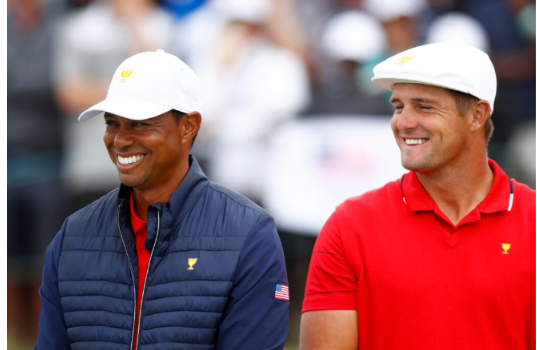As players navigate the burgeoning divide between the PGA Tour and the emerging LIV Golf league, recent interactions, particularly those involving Bryson DeChambeau and Tiger Woods, suggest that underlying tension is more palpable than some may admit.
At LIV Golf’s recent event in Orlando, DeChambeau found himself confronted with questions about strained relationships within the golfing fraternity. In response, the US Open champion reportedly chuckled before shedding light on a notable fallout with Woods, one of golf’s all-time greats, following his controversial switch to Greg Norman’s camp.
DeChambeau acknowledged their once-strong friendship, noting that he had even reached out to Woods on his birthday. However, he hinted at Woods’ disapproval of his move and concerns over its potential impact on his own legacy, stating, “He has his viewpoints on it and thinks we’re potentially hurting his record.”
The rift between Woods and DeChambeau, underscored by their lackluster performance as a team during the 2018 Ryder Cup, paints a stark picture of the shifting dynamics within the sport.
While DeChambeau’s allegiance to LIV Golf has strained some relationships, fellow LIV competitors like Brooks Koepka and Bubba Watson have downplayed any animosity from their side.
However, it’s evident that the ripple effects extend beyond DeChambeau and Woods. Notably, the once-amicable relationship between Rory McIlroy and Sergio Garcia has also soured amid the ongoing divide.
DeChambeau’s involvement in an antitrust lawsuit against the PGA Tour in 2022 further underscores the simmering discontent among players, highlighting deep-rooted grievances that extend beyond personal affiliations.
Despite losing a friend in Woods, DeChambeau remains steadfast in his decision to join LIV Golf, expressing optimism about the league’s potential for growth and its ability to reshape the landscape of professional golf.
Reflecting on his transition, DeChambeau maintains a sense of contentment, noting, “I miss nothing. I love the fans, I love the people who came to support me.” He acknowledges the slow but steady progress in garnering support for LIV Golf and remains hopeful for its future trajectory.
As tensions continue to simmer between traditional golfing institutions and the disruptive force of LIV Golf, the sport finds itself at a crossroads, with players navigating allegiances, legacies, and the ever-evolving landscape of professional golf.
